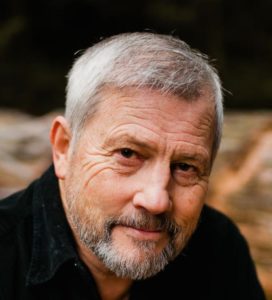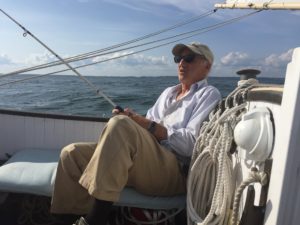Kevin Baker: The Fall of a Great American City: New York and the Urban Crisis of Affluence
January 28, 2020 by David
Filed under Non-Fiction, WritersCast
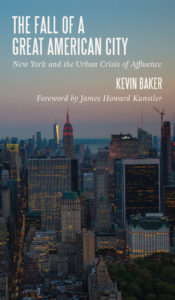 The Fall of a Great American City: New York and the Urban Crisis of Affluence – Kevin Baker (foreword by James Howard Kunstler) – 9781947951143 – City Point Press/Harper’s Magazine – Hardcover – 176 pages – October 8, 2019 – eBook editions available at lower prices.
The Fall of a Great American City: New York and the Urban Crisis of Affluence – Kevin Baker (foreword by James Howard Kunstler) – 9781947951143 – City Point Press/Harper’s Magazine – Hardcover – 176 pages – October 8, 2019 – eBook editions available at lower prices.
Kevin Baker has been one of my favorite writers for many years. He authored a wonderful baseball novel, Sometimes You See It Coming, based loosely on the life of Ty Cobb, but set in the modern day. I have read that book at least twice. Later, I was fortunate to work with Kevin on a project for the History Channel, and I have long appreciated his nonfiction history writing as well. When I read his essay in the July, 2018 issue of Harper’s Magazine, where Kevin often publishes on current affairs, called The Death of a Once Great City, I felt strongly that this story needed to be read as widely as possible. Kevin’s perceptive observations about New York City and its modern real estate-based problems, resonated with my own experience of the direction that modern American culture is moving. His piece seemed to me important enough to be made into a book.
Harper’s John MacArthur and Lynn Carlson agreed with my thinking, and together with Kevin, we worked out an arrangement for publication of an expanded and enhanced version of Kevin’s original essay to be published in book form by my imprint, City Point Press. I am very pleased to have been able to work with Kevin and Harper’s on what is now called The Fall of a Great American City: New York and the Urban Crisis of Affluence.
This is the story of what is happening today in New York City and in many other cities across America. It is about how the crisis of affluence is now driving out everything we love most about cities: small shops, decent restaurants, public space, street life, affordable apartments, responsive government, beauty, idiosyncrasy, each other. This is the story of how we came to lose so much—how the places we love most were turned over to land bankers, billionaires, the worst people in the world, and criminal landlords—and how we can – and must – begin to take them back.
I think this is an important story and hope my listeners will agree. I do not usually talk to writers about books I have published myself for Writerscast, as I do not want this podcast to be about the books I publish rather than the books I read. But in this case, since I came to this book through the original essay that I did read, I think it is meaningful to present my conversation with Kevin for your listening enjoyment.
Kevin is a terrific writer, and this book presents a strong case for rethinking our approach to modern urban life. New York, San Francisco, Los Angeles, Chicago, Boston, and many other cities are all suffering through the same sorts of real estate crises. I was not alone in being moved by Kevin’s piece in Harper’s – the magazine has reported that the original essay was one of the most read of all pieces it has ever published and has “gone viral” online to reach a vast audience.
This story affects us all and challenges us to rethink how we approach the public good.
Kevin Baker grew up in Rockport, Massachusetts, graduated from Columbia University in New York City in 1980, and since then has earned his living as a writer and editor. Dreamland, part of Baker’s New York‚ City of Fire trilogy was published in 1999, Paradise Alley issued in 2002, and the third and final volume of the trilogy, Strivers Row, was published in 2006. Kevin was the chief historical researcher on Harold Evans’ best–selling history, The American Century, published in 1999. He wrote the monthly “In the News” column for American Heritage magazine from 1998-2007, and has been published in the New York Times, the New Republic, Politico.com, New York magazine, the Washington Post, the Chicago Tribune, the Los Angeles Times, and of course, Harper’s magazine, among other publications. He is a 2017 Guggenheim Fellow for nonfiction. Kevin is married and lives in New York City.
You can purchase books featured on Writerscast from indie bookseller, RJ Julia. Buy The Fall of a Great American City here.
Visit Kevin Baker’s website here.
Visit City Point Press here.
Podcast: Play in new window | Download
Christina Thompson: Sea People: The Puzzle of Polynesia
January 14, 2020 by David
Filed under Non-Fiction, WritersCast
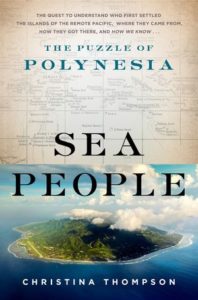 Sea People: The Puzzle of Polynesia – Christina Thompson – 9780062060877 – Harper – Hardcover – 384 pages – $29.99 – March 12, 2019 – ebook editions also available at lower prices, varying by outlet.
Sea People: The Puzzle of Polynesia – Christina Thompson – 9780062060877 – Harper – Hardcover – 384 pages – $29.99 – March 12, 2019 – ebook editions also available at lower prices, varying by outlet.
“I loved this book. I found Sea People the most intelligent, empathic, engaging, wide-ranging, informative, and authoritative treatment of Polynesian mysteries that I have ever read. Christina Thompson’s gorgeous writing arises from a deep well of research and succeeds in conjuring a lost world.”
– Dava Sobel, bestselling author of Longitude and The Glass Universe
I completely agree with Dava Sobel. This is an incredible book, probably the best introduction to the ancient and modern world of the Polynesian people of the Pacific islands you could ever read. She starts with an anecdote of modern Polynesia that aptly sets the scene for the entire story. Thompson is married to a Maori (her first book, Come on Shore and We Will Kill and Eat You, tells the history of the Maori people of New Zealand, who are among the many groups of Polynesians). When she and her husband are in Hawaii about to rent a kayak, the Hawaiian managing the concession tells them it rents for “thirty dollars….but twenty for you, brother.” It’s a striking moment, giving Thompson the opportunity to explain the entire outline and genesis of the book. Polynesians all over the Pacific from New Zealand to Hawaii to the Easter Islands are related to one another. They all instantly recognize the cultural connection, and while many of the lifeways and life skills that existed hundreds or a thousand years ago have disappeared, and European and Asian influences have spread throughout the region, the ocean environment is what it always was. The mystery is, of course, how did the Polynesians navigate the open ocean for over 1000 years to populate the vast majority of the Pacific Ocean? Sea People tells that story brilliantly.
Through the course of this deftly written book, Thompson tells us how the earliest identifiable Polynesians settled this vast region. She explores what was once called the “Problem of Polynesian Origins” that fascinated the thinking of many European scientists during the late nineteenth century and into the modern era, where a variety of theories have competed to explain who the Polynesians are and how they got there (from the east or from the west, for example.)
This book is a comprehensive telling of history, geography, anthropology, and includes a great deal about the science of navigation. It’s a completely engrossing and riveting read, making it one of the more satisfying nonfiction books I have read in a long time.
Christina is a great person to talk to, so knowledgeable and comfortable with her material and never dry or pedantic in her approach to communicating so much of what she knows. It was a pleasure to speak with her for Writerscast.
My interview with Christina Thompson about her (wonderful) previous book, Come on Shore and We Will Kill and Eat You All can be found here on Writerscast, (originally posted in December, 2011.)
Christina’s author website is here.
The book is available for purchase from independent bookseller RJ Julia here.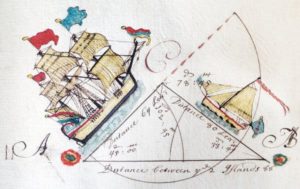
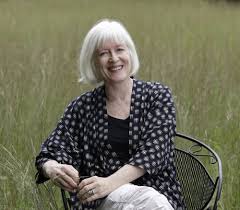
Podcast: Play in new window | Download
Brook Simons: Nothing to Write Home About
December 16, 2019 by David
Filed under Non-Fiction, WritersCast
 Nothing to Write Home About – Brook Simons – 9781626468702 – Booklocker – paperback – 232 pages – $16.95 – April 15, 2014 – ebook available at lower prices
Nothing to Write Home About – Brook Simons – 9781626468702 – Booklocker – paperback – 232 pages – $16.95 – April 15, 2014 – ebook available at lower prices
In her late twenties, in 1977, Brook Simons picked up stakes and moved to Los Angeles from Connecticut, where she grew up on a farm in a small town, which happens to be right next door to where I grew up. While Brook and I did not know each other in Connecticut, she ended up marrying an old friend of mine from Yale, who also moved to LA to start a new life just after Brook did. So while we have never met, I felt a connection to this book from the outset.
Brook’s memoir is one of the bravest and rawest pieces of personal nonfiction I have ever read. I think the word insouciant fits who Brook was during the time of this story, which coincides with the rise of the drug fueled stand up comedians who gathered in Los Angeles around the Comedy Club and television studios of Hollywood in an anxiety and angst ridden explosion of personal exposure. Not all of the funny stuff was really funny, and the mostly male community of comics was pretty solidly male-centered and frankly not only self loathing and self degrading, but extremely misogynistic.
In some ways, brash young Brook fit in with this crew, as her story shows us so evocatively and painfully. She loved the energy, the drugs, and the comedy, but she also became attached to one of the comedians with whom she developed a highly dysfunctional and brutal relationship that ultimately led her to the brink of disaster on many levels.
There really is a lot to write home about here, and Brook writes it well. I don’t want to give away the story in any form. I think you should listen to our conversation and then read the book to understand the story Brook is telling on herself toward showing how danger and power can seduce us, take us beyond the places that are safe, and sometimes cause damage that goes far beyond what anyone should be able to experience. It’s a story that antedates #MeToo, but which ought to be required reading for every woman and man who cares about changing the power relationships between male and female in a positive way.
I was really stunned by this book and hope you will find this interview of interest, along with the book itself. You can buy it from my friends at RJ Julia Booksellers in Madison, Connecticut. Support independent bookselling and order Nothing to Write Home About here.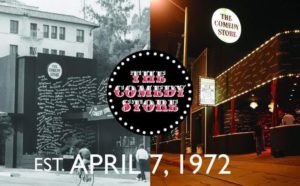
Podcast: Play in new window | Download
Christopher Ingraham: If You Lived Here You’d Be Home By Now
December 3, 2019 by David
Filed under Non-Fiction, WritersCast
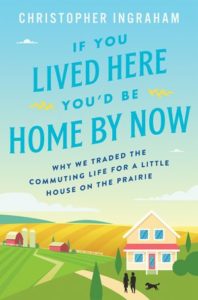 If You Lived Here You’d Be Home By Now: Why We Traded the Commuting Life for a Little House on the Prairie – Christopher Ingraham – 9780062861474 – Harper Collins – Hardcover – 288 pages – $24.99 – September 10, 2019 – ebook version available at lower prices.
If You Lived Here You’d Be Home By Now: Why We Traded the Commuting Life for a Little House on the Prairie – Christopher Ingraham – 9780062861474 – Harper Collins – Hardcover – 288 pages – $24.99 – September 10, 2019 – ebook version available at lower prices.
Despite both having good jobs, Chris Ingraham, a data reporter at the Washington Post, and his wife Briana, an administrator at a Social Security office, were having trouble with the mechanics of raising twin boys in the expensive metro area suburbs. One day, Chris wrote an article that would change his life. It was based on a USDA ranking of America’s 3,000+ counties from ugliest to most scenic. Chris found Red Lake County, Minnesota at the bottom of the list and without thinking about the people who lived there, called it “The absolute worst place to live in America.” In the quiet of an end of summer news cycle, his seemingly innocuous story went viral with a vengeance.
And unsurprisingly, some of the strongest reactions came from residents of Red Lake County. In their “Minnesota Nice” way, they asked him to think outside the numbers, and actually visit their community, and Chris, perhaps against his better judgement, agreed to fly to this isolated area of northwestern Minnesota to see for himself. He was surprised by the people he found there, not just because they were nice, but because the small towns and rural areas of northern Minnesota – miles from the nearest Whole Foods and Starbucks – turned out to be more than nice, but warm, familial and interesting.
But the big twist in the story turns out to be that after realizing how hard it was for them to live happily where they were, Chris and Briana and their kids decided to pick up stakes and move to the same Minnesota community his article had dissed in the first place.
If You Lived Here You’d Be Home by Now is ultimately, then about what happens when you make a momentous life decision that changes your life and challenges everything you think you know about yourselves and your country. In Red Lake County, the Ingraham family experience the travails of small-town gossip, learn how to deal with “real” winters in a place where temperatures commonly reach forty below zero, try to understand new activities like hunting and hockey, and how to relate to nearby neighbors who know everything about your daily comings and goings. But they also learn the joys and pleasures of life in a small community, where what you do can make a huge difference. Ingraham has a great sense of humor and is a natural storyteller. And while not everything that happens to them is either uplifting or transcendent, there is a lot here for all of us to learn about the truths and myths of small town life in America.
Ingraham has the benefit of being able to work remotely for the Washington Post, so he at least does not have to struggle with the difficulty of finding work in a small town, something that is a huge problem for many Americans who do want to stay in their hometowns. And not everyone who chooses to live in small town America is either some sort of hero or a victim of bad judgment; life is much more complex than that. The story of Chris and Briana and their kids making a massive life change is a great reminder, however, that there is so much experience in rural areas that is worthy of celebrating and preserving, before our entire country becomes a giant suburban mall.
“Thank you, Christopher Ingraham for venturing out of the bubble of stereotyping and misunderstanding that often confines American urbanites who never leave the city and smugly judge rural Americans from their leather couches. I love Mr. Ingraham for his open mind and reporter’s grasp of detail and complicated truth. He captures the charm of a small town entertainingly, without sentimentality or the canned platitudes of those who drop in for a day and count themselves expert analysts after lunchtime. Good work!”
– George Hodgman, NY Times bestselling author of Bettyville
I am pleased to announce a new enhancement to Writerscast — all the books we feature are available for purchase from our friends at R.J. Julia Booksellers in Madison, Connecticut.
You can buy a copy of If You Lived Here, You’d Be Home by Now, and know that by doing so, you are supporting independent bookselling. Click on this link to visit the RJ Julia bookstore site.
A fun PBS story about Chris, family, Minnesota and the book is here.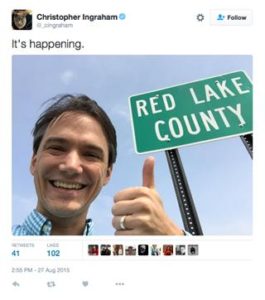
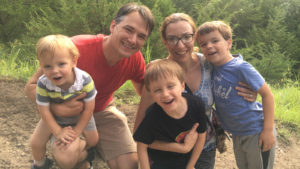
Podcast: Play in new window | Download
Karl Marlantes: Deep River, a Novel
November 19, 2019 by David
Filed under Fiction, WritersCast
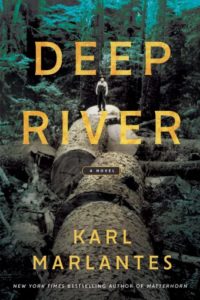 Deep River – Karl Marlantes – 978-0-8021-2538-5 – Atlantic Monthly Press – Hardcover – 736 pages – $30 – July 2, 2019 – ebook version widely available at lower prices.
Deep River – Karl Marlantes – 978-0-8021-2538-5 – Atlantic Monthly Press – Hardcover – 736 pages – $30 – July 2, 2019 – ebook version widely available at lower prices.
“Deep River seems a work born from Willa Cather by way of Upton Sinclair. But this new book is its own animal, and it’s something of a masterpiece… In Deep River, [Aino] takes her place beside Antonia Shimerda as one of the great heroines of literature.”—BookPage (starred review)
Several years ago I discovered Karl Marlantes’ first novel, Matterhorn, which is a loosely autobiographical novel about the Vietnam War, in which Karl served as a Marine lieutenant. I think that is one of the best war novels I have ever read and was pleased to interview Karl about that book.
That book was followed by a nonfiction book called What it is Like to Go to War, which I also read and was affected by. What I said in 2011 still holds true: this book is a deeply thoughtful and moving work of nonfiction about the nature and meaning of war, and what it means to the individual warriors who participate who fight, as well as to the society that gives them that responsibility.
It took Marlantes almost thirty years to write and rewrite Matterhorn. Almost ten years after he completed that book, he has now turned in a completely different book, an historical novel set in the early 1900s, starting in Russian occupied Finland and moving to the Pacific Northwest. The three Koski siblings, Ilmari, Matti, and the politically radical young Aino, flee Russian oppression and come to the United States.
They join a community of other Finns in the logging area in southern Washington, during a time when massive trees of the old growth forest are being harvested by hard working men and dangerous technology. It is fertile ground for the establishment of radical labor movements like the IWW (Industrial Workers of the World, also known as the Wobblies). The two Koski brothers build their lives in this environment amid danger and many challenges, while Aino, just one of the book’s many also hard working independent women, works to build a union in an environment where organized labor is not welcomed by the logging industry or the power structures of the day.
Karl has built this novel following the structure and characters of the great stories of the Finnish oral tradition, written down in the nineteenth century as the Kalevala. It is a truly magisterial novel that weaves together so many strands of American and immigrant cultures, documents the struggles of the early twentieth century in the great forests of the Pacific Northwest, and shows us how human beings find a way to make meaningful lives despite the harshest challenges. Nothing comes easy for the Koskis their friends and families, but everything about them is redemptive and strong. It’s impossible to read this book and not be moved.
Reading Deep River is a commitment – it’s a long book – and there are inevitably times when it becomes difficult to keep track of the whole story and the many compelling characters in the book. That is not a criticism. The book is gripping, and well worth the time and attention of the reader. And it is impossible not to read it in the context of our current political circumstance. Reading about the sacrifices made by workers in the early twentieth century, to make advances for labor that are now taken for granted, and imagining their struggles as evidenced by the characters in this book, who are so thoroughly human in their differences and outlooks, personalities and beliefs, brings forth a range of thoughts about what has become of America today. We live in a world that others made great sacrifices for, and have somehow managed to avoid making sacrifices of our own. The people of Deep River as imagined by Karl Marlantes, deserve better from us.
I had the great pleasure to interview Karl in New Haven in a building on the Yale campus, where he was visiting during his book tour.
Karl Marlantes graduated from Yale University and was a Rhodes Scholar at Oxford University, before serving as a Marine in Vietnam, where he was awarded the Navy Cross, the Bronze Star, two Navy Commendation Medals for valor, two Purple Hearts, and ten air medals. He is the author of the novel, Matterhorn and a work of nonfiction, What It Is Like to Go to War. He lives now in Washington State.
Buy Deep River from RJ Julia here.
Podcast: Play in new window | Download
Thom Hartmann: The Hidden History of the Supreme Court and the Betrayal of America
October 22, 2019 by David
Filed under Non-Fiction, WritersCast
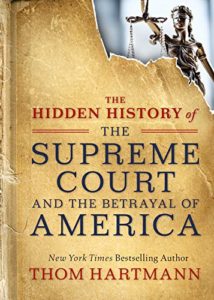 The Hidden History of the Supreme Court and the Betrayal of America – Thom Hartmann – ISBN 9781523085941 – Berrett-Koehler Publishers – Paperback – 192 pages – $15.00 – October 1, 2019 – ebook versions available at lower prices
The Hidden History of the Supreme Court and the Betrayal of America – Thom Hartmann – ISBN 9781523085941 – Berrett-Koehler Publishers – Paperback – 192 pages – $15.00 – October 1, 2019 – ebook versions available at lower prices
“Hartmann delivers a full-throated indictment of the U.S. Supreme Court in this punchy polemic.” —Publishers Weekly
This is a really important (and very short) book – so you have no excuse not to read it – no matter how busy you are.
Thom Hartmann has been a popular progressive radio host for years. In this book, he carefully and succinctly explains how the Supreme Court has gone far beyond its actual Constitutionally derived powers and provides some cogent guidance on how we can change it.
In the beginning, and until 1803, the Supreme Court was simply viewed as the final court of appeals in the judicial system, the branch of government with the least power of the three set forth in the Constitution. So we have to find out how did the concept of judicial review start, and as Hartmann points out, it began with the battle between the Federalists and Anti-Federalists, with the now well-known case known as Marbury v. Madison.
It is Hartmann’s view, and he argues persuasively, that it is not the role of the Supreme Court to decide what the law is, but rather the duty of the people through the legislative branch. He summarizes the history of the Supreme Court, giving some important examples of cases where the Supreme Court appears to have overstepped its constitutional authority.
So much of our history and beliefs about this country are mystified by a sort of glorification of a romanticized and suspect view of the Constitution and the powers of our branches of government. The Supreme Court today reflects the concerted effort of a small segment of society to control and reduce democratic principles and practices that would harm their interests. Hartmann’s book is an essential and very handy guide for anyone who would like to explore what we can do to rein in the power of the courts and increase democracy in our country. If you read Nancy McLean’s Democracy Unchained, as I hope you have, or if you are simply interested in both protecting and expanding democracy in our country, then reading this book is essential.
Buy the book from RJ Julia bookstore here.
Thom Hartmann is a progressive syndicated talk show host whose shows are available in over a half-billion homes worldwide. He’s the New York Times bestselling, 4-times Project Censored Award-winning author of 24 books in print. His radio show is syndicated on for-profit FM and AM radio stations nationally, on non-profit and community stations nationwide by Pacifica, across the entire North American continent on SiriusXM Satellite radio, on cable systems nationwide by Cable Radio Network (CRN), via subscription audio podcasts, worldwide through the US Armed Forces Network, and through the Thom Hartmann iOS and Android apps. Visit Thom’s own website to learn more about his work and many useful books. 
Podcast: Play in new window | Download
Amy Stross: The Suburban Micro-Farm
September 19, 2019 by David
Filed under Non-Fiction, WritersCast
 The Suburban Micro-Farm: Modern Solutions for Busy People – Amy Stross – 9780997520835 – Twisted Creek Press – Paperback – 356 pages – $34.95 – March 23, 2018 – ebook versions available at reduced prices.
The Suburban Micro-Farm: Modern Solutions for Busy People – Amy Stross – 9780997520835 – Twisted Creek Press – Paperback – 356 pages – $34.95 – March 23, 2018 – ebook versions available at reduced prices.
“…this book takes a permaculture approach to starting a micro-farm in the suburbs that speaks not just to a stay-at-home mom or dad, but to all busy people. Indeed, it is one of the few gardening books that is aware that you may not have a lot of time to start a garden, and shows you that it’s still possible anyway.” – Jesse Frost, Hobby Farms
I love gardening, gardens, and would be thrilled if every suburban lawn was turned into a vegetable garden, berry patch or orchard (or all of those things). I’m an enthusiastic gardener, but not a great planner, and I need the kind of help that Amy Stross provides in this truly excellent book. Even if you never pick up a hoe or dig in the dirt, you will learn a huge amount about food growing in relatively small spaces from this book and you will be able to explain to your neighbors, friends and family why they all should be outside right now working on their gardens.
There is so much good information, and reading this book is so inspiring, it is impossible to know where to begin in describing it. Suffice to say, while there are many great books about gardening, but this one deserves to be on every gardener’s bookshelf, and especially for any beginner who wonders how to get started, this book is essential. There is alot of work involved when you seriously grow vegetables and fruit in a small space, and planning is essential. This book provides the gardener, beginner or otherwise, with terrific tools for planning and organizing, and for avoiding the many mistakes that are easy to make along the way to growing your own fruit and vegetables.
Now that it’s fall, this is the perfect time to start planning your garden for next year. Read this book, lay out and build your garden beds, and order seeds for spring! If you’ve never gardened before, start with a small space you can handle and build from there.
Here are just a few things covered in The Suburban Micro-Farm:
How to make your landscape as productive as it is beautiful
Why the suburbs are primed with food-growing potential
How to choose the best crops for success
Why you don’t need the perfect yard to have a micro-farm
How to use easy permaculture techniques for abundant harvests
The idea of an edible yard is more than just romantic, it is a practicality for many of us. There are lots of benefits besides being able to grow your own food – getting rid of lawns and lawn maintenance is good for the natural environment and makes a dent in climate change mitigation, raising vegetables and fruit is healthy for your body in two ways – the work of gardening is good for your health and the food you eat from the work you put in is always better than what you can buy in a store, even an organic one.
Amy is a terrific teacher, well organized, thoughtful and clear eyed.
I really enjoyed speaking with her and recommend this book to any and all who will listen. Visit her website here to learn more about Amy, her approach to gardening, and where to buy the book (though I recommend purchasing from my friends at Chelsea Green Press, who have been publishing books in this category for many years).
And have fun in the dirt! I was inspired by reading this book to build a bigger garden this year, which was very productive, and next year, we are planting blueberries and fruit trees in our very small front yard. Thank you Amy Stross!
Nonfiction Book Awards 2018 Gold Winner
Foreword INDIE Awards 2018 Gold Winner (Hobbies & Home category)
Nautilus Book Awards 2018 Silver Winner (Green Living & Sustainability category)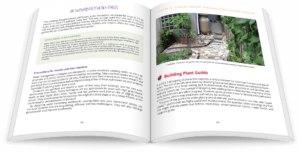


Podcast: Play in new window | Download
Fred Waitzkin: Deep Water Blues, a Novel
August 18, 2019 by David
Filed under Fiction, WritersCast
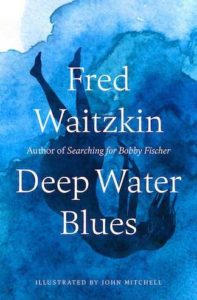 Deep Water Blues: A Novel – Fred Waitzkin – 9781504057745 – 160 pages – Open Road Media – paperback – May 28, 2019 – $17.00 – ebook versions available at lower prices.
Deep Water Blues: A Novel – Fred Waitzkin – 9781504057745 – 160 pages – Open Road Media – paperback – May 28, 2019 – $17.00 – ebook versions available at lower prices.
Fred Waitzkin’s Deep Water Blues is a surprisingly affecting short novel based to a great extent on his personal experiences in a small boat on the open water and islands of the Caribbean. Because it is based in so much lived experience, it has an authenticity that shines through in every page. In Deep Water Blues three older men (including the boat’s owner) and one younger man, a painter who has never been to sea, leave Ft. Lauderdale on an old boat heading for a Bahamian island that has an almost mythical story and appeal. Each is there for a different reason and each will gain something different from their adventure. But the story is really about the island and the mysteries of what happened there.
When I first started reading this book, I did not expect to find it as compelling as I did in the end. There’s alot more here than initially meets the eye, and this is a book I can recommend to readers.
Waitzkin calls his book a “curated blend of real-life experience and fiction.” Deep Water Blues tells a compelling story about an unusual man in an exotic place, an almost mythical story whose hero suffers a classic fate and redemption in a mysterious and beautiful location, bringing to mind Shakespearean and Biblical storytelling. Waitzkin writes in spare prose that carries his story through to its exciting end, and makes a short book impactful beyond its length.
Fred Waitzkin was born in Cambridge Massachusetts. He was an English major at Kenyon College in Ohio, then taught English at The College of the Virgin Islands, where he also got to pursue his love of fishing for big game fish. Fred and his wife moved to New York City, where Waitzkin wrote feature journalism, personal essays and reviews for numerous magazines including Esquire, Forbes, the New York Times Sunday Magazine, the New York Times Book Review, New York Magazine, Outside Magazine, and Sports Illustrated.
Waitzkin’s first book was Searching for Bobby Fischer. Published in 1984, it’s the story of three years in the lives of Fred and his chess prodigy son, Josh Waitzkin. The book became an internationally acclaimed best seller, and the film based on it was nominated for an academy award.
Mortal Games, his biography of world chess champion, Garry Kasparov was published in 1993, and was followed in 2000 by The Last Marlin, a memoir. The Dream Merchant, Waitzkin’s first novel, was published in 2013 – Deep Water Blues is his second published work of fiction. Fred still lives in Manhattan with his wife Bonnie, and still spends as much time as possible on his old boat, Ebb Tide.
It was my pleasure to speak with Fred, and while we talked about the book at hand, our conversation went into a variety of related coves and channels.
Visit Fred Waitzkin’s website to learn more about him and his writing.
“Deep Water Blues does what all fine literature aspires for – it transports readers to another time and place, in this case, to a sleepy, lush island deep in the Bahamas. Fred Waitzkin writes about life, sex and violence with aplomb, and Bobby Little is a tragic hero fit for the Greek myths. Hope to see everyone on Rum Cay soon.” – Matt Gallagher, author of Youngblood
“Fred Waitzkin effortlessly recreates a singular world with uncanny insight and humor. His language is remarkable for its clarity and simplicity. Yet his themes are profound. This is like sitting by a fire with a master storyteller whose true power is in the realm of imagination and magic.” – Gabriel Byrne, actor and director
Podcast: Play in new window | Download
Cuong Lu: The Buddha in Jail – Restoring Lives, Finding Hope and Freedom
July 18, 2019 by David
Filed under Non-Fiction, WritersCast
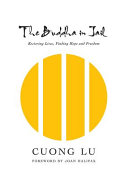 The Buddha in Jail: Restoring Lives, Finding Hope and Freedom – Cuong Lu – OR Books – paperback – 112 pages – 978-1-682191-84-2 – $18.95 – April 2, 2019 – ebook versions available at lower prices.
The Buddha in Jail: Restoring Lives, Finding Hope and Freedom – Cuong Lu – OR Books – paperback – 112 pages – 978-1-682191-84-2 – $18.95 – April 2, 2019 – ebook versions available at lower prices.
Foreword by Roshi Joan Halifax.
I’ve studied and read and been around Buddhist teachings for a number of years. I’ve always been attracted to Buddhism’s psychological approach and to its ideas about self, being and letting go of suffering, though I have never practiced Buddhist meditation enough to attain a meaningful experience of inner peace. Reading Cuong Lu’s short book was a powerful experience for me, because unlike many books about Buddhism, it is so practical, and so filled with lived experience. Socially engaged Buddhism is extremely powerful, as it brings concepts of inner peace and understanding into play with the actual lived experience of people and works with their actual suffering. It is not theory, but practice. Cuong Lu lives that experience and brings it to us in a really meaningful way.
Cuong Lu was a Vietnamese refugee who arrived in Holland as a young boy, and struggled to learn who he was in a country that was very foreign to him, after many traumatic experiences. He discovered Buddhism and spent a number of years studying with the renowned Vietnamese Buddhist teacher, Thich Nhat Hanh, and in 1993 was ordained a monk at Hanh’s community, Plum Village in France. In 2000, he was recognized as a teacher in the Lieu Quan line of the Linji School of Zen Buddhism and then spent six years ministering to inmates in Dutch prisons as a prison chaplain.
This book is a collection of 52 vignettes – the stories and teachings in which Cuong Lu shares insights into the prisoner’s mindset, and by extension all of us, those who are physically imprisoned, and of course, those many others of us who are psychologically imprisoned.
As a prison chaplain, Cuong discovered that when the men inside allowed themselves to feel their pain – connecting to their buried and unacknowledged feelings, that knowing and feeling the truth enabled them to find inner sources of strength they had never experienced previously. When these prisoners felt themselves to be touched, and accepted without judgment, understood in a pure way, it transformed their sense of self, with the result that they were able to change their own attitudes, self images, and ultimately their behavior and relationships to others.
Ultimately, this book is not about the prisoners. It’s about each of us who read the book. We limit our ideas of ourselves, of self and confused projection for reality. We don’t understand or recognize what freedom and happiness are, that they are states we can experience deeply and thoroughly through a fuller understanding of the nature of our beings and relationship to self and universe. It will always require a process to attain this kind of understanding, but when we do the work of meditation and inner viewing, we discover the freedom and happiness already within. This book can be viewed as an introduction to a way of living and being that might change our world for the better.
Speaking with Cuong Lu, it is easy to understand why he is such a great teacher. He is centered, calm and clear, and able to explain easily the sometimes complex and confusing system of understanding that Buddhism represents. It was a great pleasure for me to have the opportunity to speak with him about this book and his experiences.
“In The Buddha in Jail, Cuong Lu demonstrates how to be in a helping relationship without getting caught in roles. As a prison chaplain, he did not attach to the idea of being a helper, or even of ‘helping.’ He sat quietly, deeply present with each inmate, and saw each of them as a soul, not just their personality or their troubled past. By dwelling in love with each person, accepting them without judgment, one by one they transformed, and their recidivism was close to zero. I congratulate Cuong Lu for the depth of his prison ministry and this beautiful book.” —Ram Dass, author of Be Here Now and Walking Each Other Home: Conversations on Loving and Dying
“To free ourselves, we have to unlock the doors from within. Chaplains like Cuong Lu play an essential role in freeing those in prison from their inner demons, offering guidance, support, and loving kindness, teaching stillness and self-reflection, learning to connect with their fierce and loving hearts. I highly recommend The Buddha in Jail, a good read and a great resource for understanding prisoners and for finding the keys to the prisons in our own minds.”
—Spring Was-ham, author of A Fierce Heart: Finding Strength, Courage, and Wisdom in Any Moment
Cuong Lu, Buddhist teacher, scholar, and writer, was born in Nha Trang, Vietnam, in 1968. He majored in East Asian studies at the University of Leiden, and in 1993 was ordained a monk at Plum Village in France under the guidance of Thich Nhat Hanh. In 2000, he was recognized as a teacher in the Lieu Quan line of the Linji School of Zen Buddhism. In 2015, he received a master’s degree in Buddhist Spiritual Care at Vrije University in Amsterdam. Lu is the founder of Mind Only School, in Gouda, the Netherlands, where he teaches Buddhist philosophy and psychology, specializing in Yogachara Buddhism combined with the Madhyamaka (Middle Way) School of Nagarjuna.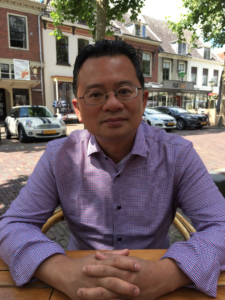
Podcast: Play in new window | Download
Adina Hoffman: Ben Hecht: Fighting Words, Moving Pictures
June 30, 2019 by David
Filed under Non-Fiction, WritersCast
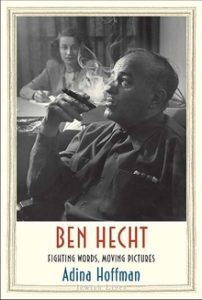 Ben Hecht: Fighting Words, Moving Pictures – Adina Hoffman – 9780300180428 – Yale University Press – Hardcover – 264 pages – $26 – February 12, 2019 – ebook versions available at lower prices
Ben Hecht: Fighting Words, Moving Pictures – Adina Hoffman – 9780300180428 – Yale University Press – Hardcover – 264 pages – $26 – February 12, 2019 – ebook versions available at lower prices
I grew up in a family where the movie business was in our blood, and part of the conversations of everyday life, so I have long known about – and appreciated – the amazing screen writing of Ben Hecht. Hecht’s many screenplays in many ways established and defined what is now standard movie practice. He wrote some of the greatest and most watched films in history, and made a well paid career out of “doctoring” other writers’ scripts. Hollywood was his reluctant artistic base for many years, though he would never be completely comfortable there.
Reading this very comprehensive, but highly readable biography by Adina Hoffman, brought Hecht’s life and work into focus for me for the first time. Hecht’s story was that of a classic 20th century second generation Jewish immigrant. He was raised in Wisconsin, made his way to Chicago, became a newspaper writer and then a novelist in the glory years after World War I, where he helped create and define the literary scene in that great city, before moving to New York, where he truly established himself as literary star.
Hecht and Charles MacArthur together wrote the now-classic play, The Front Page, becoming writing partners and pals for many years thereafter. Some of Hecht’s most famous screenplays include Scarface, Gone with the Wind, Stagecoach, Notorious and His Girl Friday. Hecht worked on literally hundreds of films, was a powerful enough writer to be able to be given the opportunity to produce four films with MacArthur (a mis-adventure described wonderfully by Hoffman). Hecht worked with some of the greatest directors, producers and actors in 20th century film. His work literally defined what a Hollywood movie could be, and much of what we think about 20th century American culture is derived from his cynical, yet optimistic worldview.
Hecht’s many novels and nonfiction books are not widely read or known today, and according to Hoffman, who has read them all, some are lost to literary history for good reason. Still, it is quite possible that this fully formed biography with its clear eyed evaluation of Hecht as passionate human, brilliant intellect and outstanding writer, will help their cause. For myself, I have made a commitment to read at least one or two of the books that Hoffman tells us are important enough to seek out, including at least one novel. I have thought about reading Hecht’s very early novel Fantazius Mallare: A Mysterious Oath, even though Hoffman pretty much dismisses it, except for one great sentence that is said to have inspired Ginsberg’s Howl. But it is his autobiography, A Child of the Century that calls out to me the most, and that I will be reading soon.
Though he was decidedly a non-secular Jew during World War II, Hecht rediscovered his Jewish identity and became a powerful public voice pressuring American politicians to save the Jews of Europe. After the war, Hecht’s Zionism led him to support the nascent Jewish state of Israel with the burning fervor of a convert, his trademark enthusiasm focused on building a safe haven for Jews, which ironically, he never visited. Hecht, as Hoffman shows us, was a complicated human being – and frequently an unforgivable one as well.
Ben Hecht was emblematic as the “child of the [20th] century” who helped to define modern Jewish America and modern popular culture. Adina Hoffman is a terrific writer and a gifted storyteller, perfectly suited to tell this story. Thanks to Yale University Press for creating an absolutely beautiful book, one that serves her writing well, and makes reading it a better experience.
Adina Hoffman is an essayist and biographer who splits her time between New Haven and Jerusalem. Fortunately, she was in New Haven when I wanted to talk to her about this book and the work that went into it. Hoffman is the author of four books, including Till We Have Built Jerusalem: Architects of a New City and My Happiness Bears No Relation to Happiness: A Poet’s Life in the Palestinian Century. She was a film critic for the American Prospect and the Jerusalem Post, and was a founder and editor of Ibis Editions, a small press devoted to the publication of the literature of the Levant. She has been a visiting professor at Wesleyan University, Middlebury College, and NYU, and was notably one of the inaugural (2013) winners of the Windham Campbell prize. Read more about Adina and Ibis Editions here.
And you can find a good bibliographical of Hecht’s work here.
Note to listeners, this interview was recording live in a room with a bit of echo, so apologies to all for the sound quality.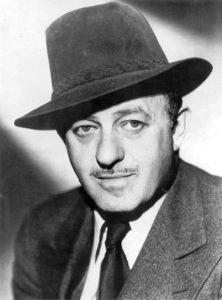
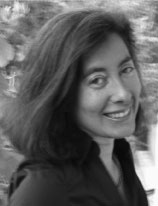
Podcast: Play in new window | Download


